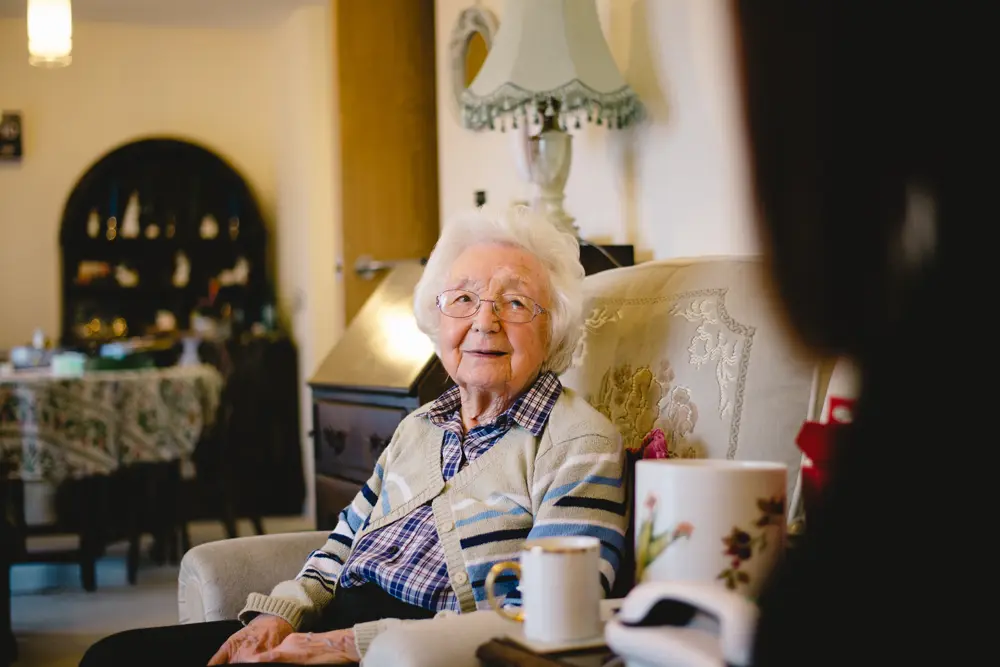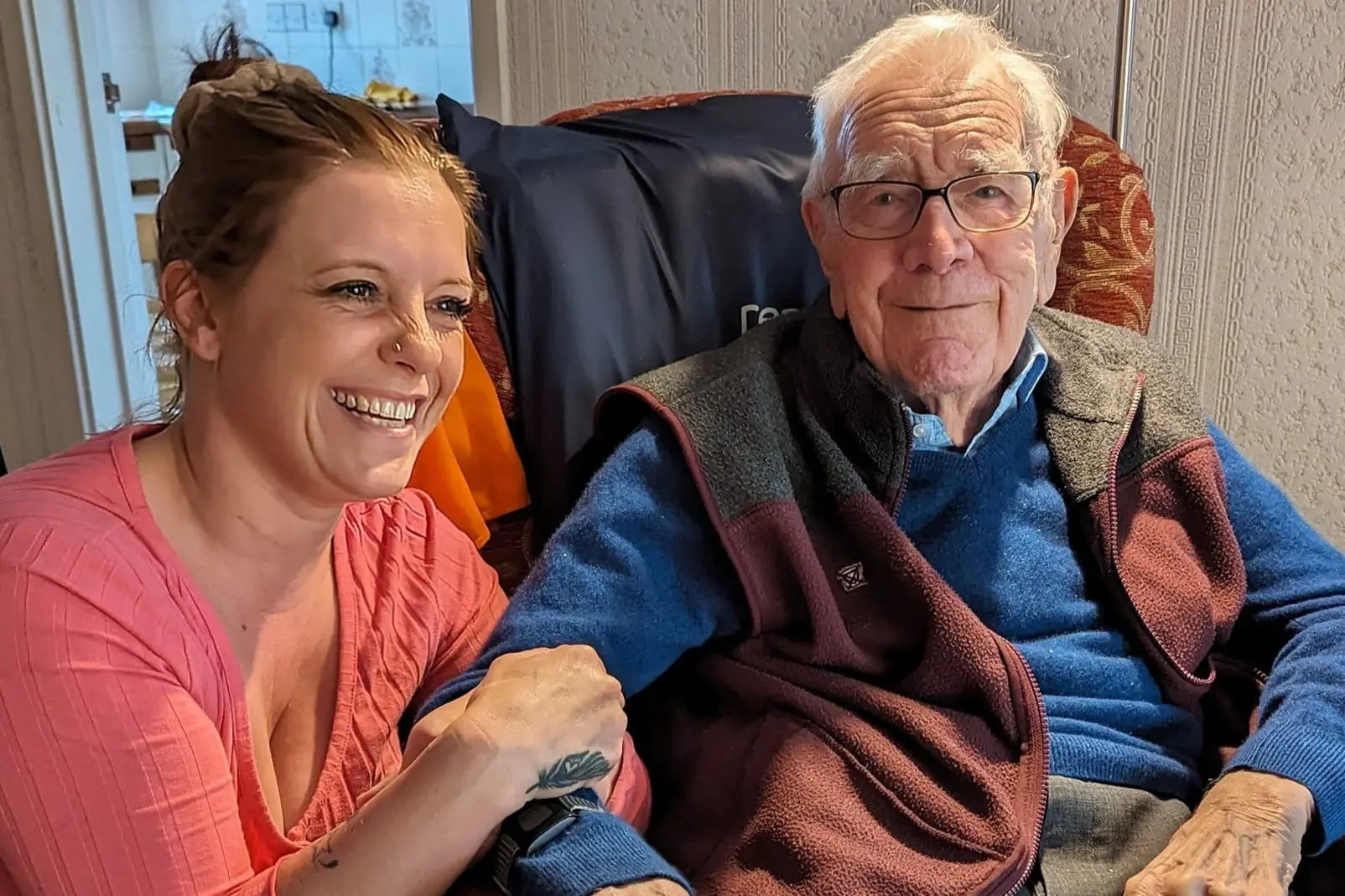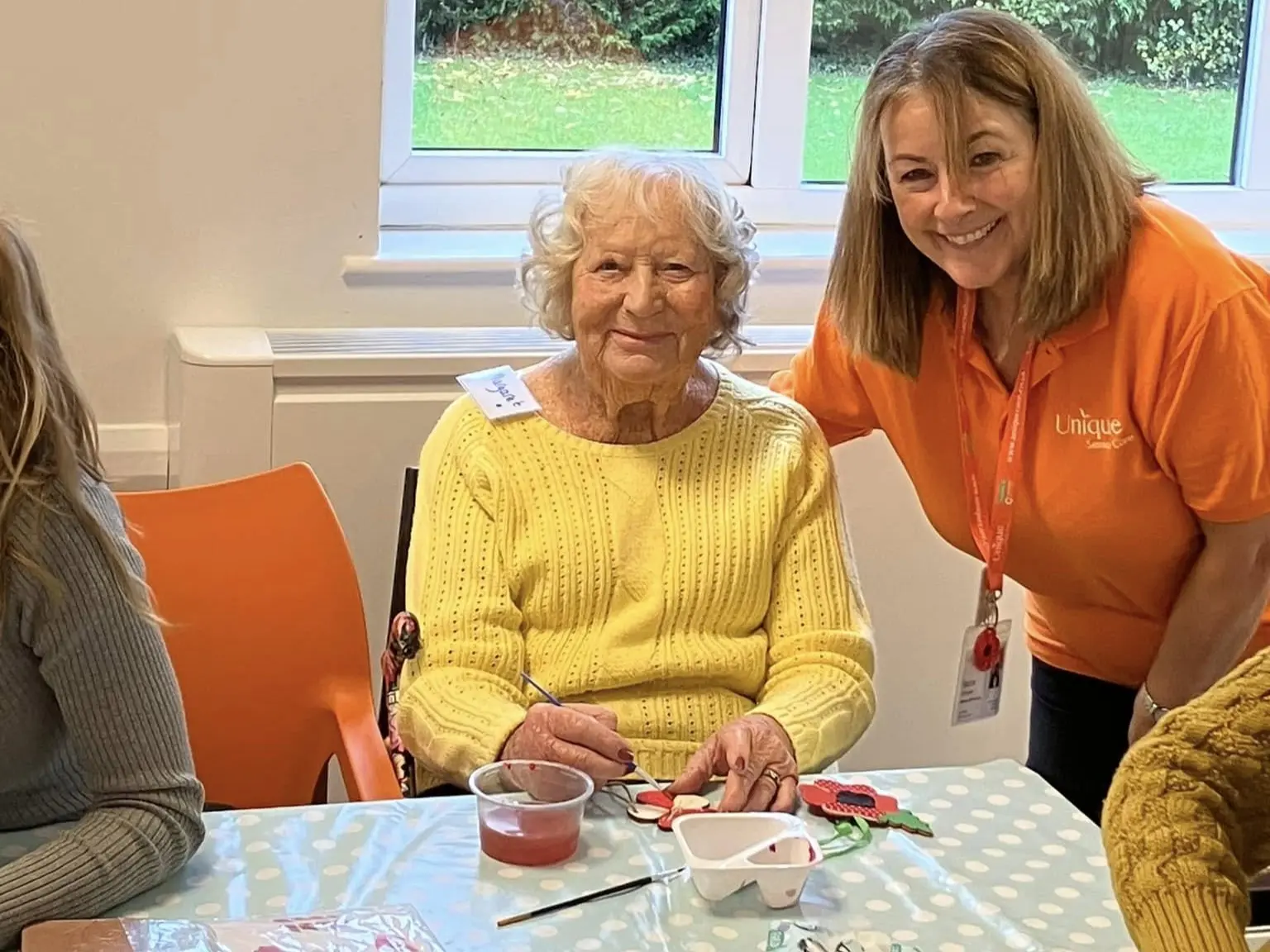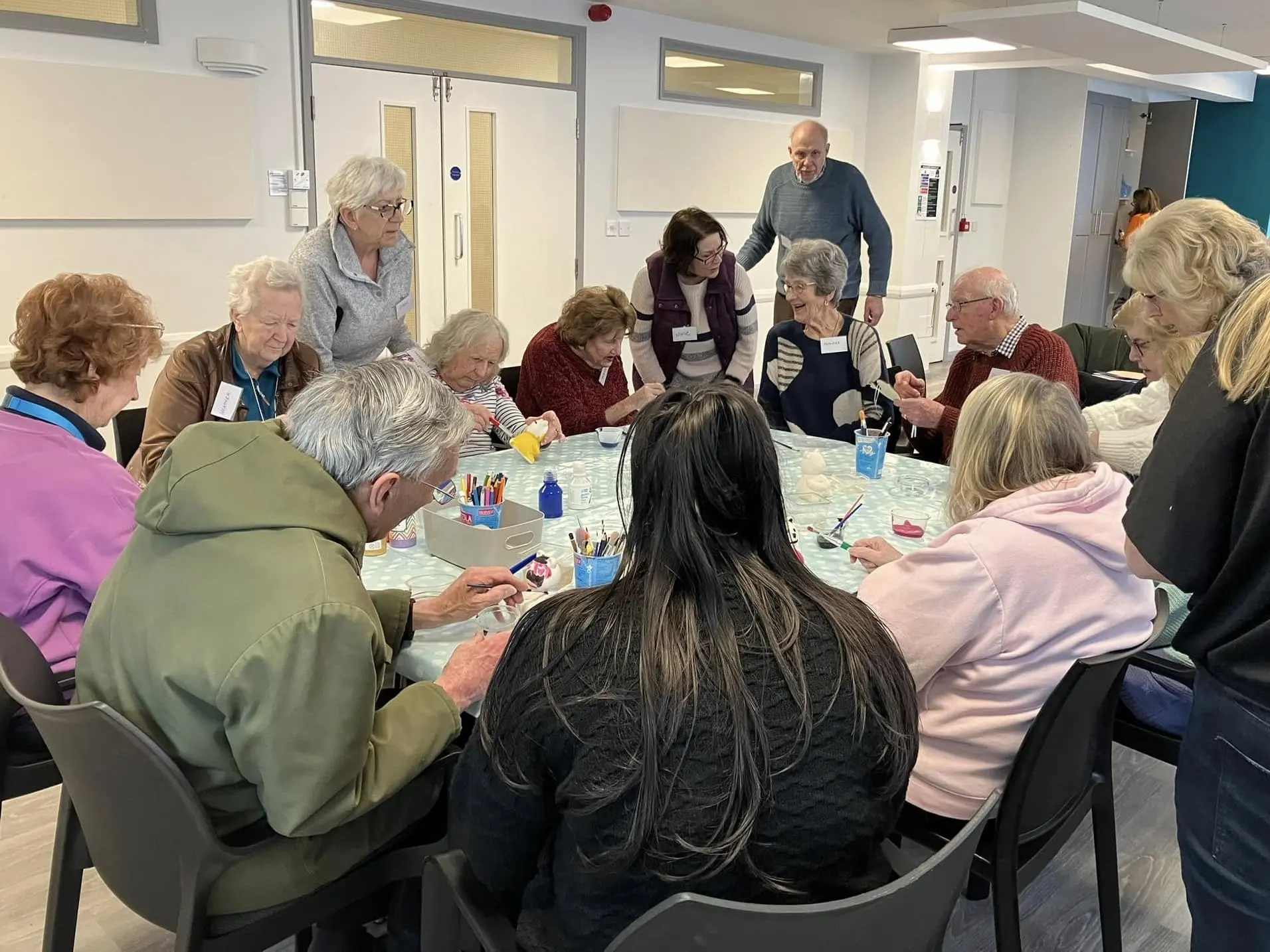Tailored at home
Living with dementia can be challenging, not just for those experiencing it, but also for their families. We understand how important it is for your loved one to stay at home, surrounded by the comfort of familiar people and routines.
Our dementia care services are designed to make that possible, with personalised care plans and compassionate support that adapts as needs change. Our goal is to bring comfort, safety, and reassurance to both the person receiving care and their family, providing peace of mind every step of the way.
Speak to a care expert




It’s been an opportunity to give my wife, who’s my long ongoing carer, two hours a week off to what she wants and there’s an element of relief to it knowing I’m not alone.


What is dementia?
Dementia is a general term used to describe a decline in cognitive function that is severe enough to interfere with daily life.
It is not a single disease but a set of symptoms that can affect memory, thinking, language, problem-solving, and the ability to perform everyday activities. Dementia is caused by damage to brain cells, which affects their ability to communicate with each other.
Alzheimer's disease is the most common form of dementia, but there are many other types, each with its own symptoms and progression.
How home care can support your loved one
Home care helps your loved one stay in the comfort of their home, surrounded by familiar things and people.
Personalised support helps to ease anxiety and keep routines consistent, which is especially important for someone living with dementia. Here are some of the ways your Caregiver can help:
Daily living: Help with bathing, dressing, grooming, and toileting.
Household tasks: Support with meals, laundry, and light cleaning.
Medication: Assistance with taking medication safely and on time.
Mobility: Help with movement, transfers, and safety.
Companionship: Engaging in conversation and activities.
Cognitive support: Encouraging stimulating activities and memory exercises
The Different Types of Dementia
Dementia comes in over 100 different forms, each affecting different parts of the brain and presenting unique symptoms. Below are some of the more common types:
Alzheimer's
Disease
This causes gradual memory loss, confusion, and behavioural changes.
Amyloid plaques and tau tangles disrupt brain connections, often affecting the hippocampus first, which is key to memory.
Vascular
Dementia
Vascular dementia is linked to reduced blood flow in the brain, often after a stroke or small vessel disease.
This type of dementia can affect planning, judgement, and reasoning abilities.
Lewy Body
Dementia
This type includes symptoms like visual hallucinations, motor issues, and fluctuating levels of alertness.
It's caused by protein deposits called Lewy bodies that affect chemicals in the brain, impacting both thinking and movement.
Frontotemporal
Dementia
Frontotemporal dementia affects the parts of the brain that control personality, behaviour, and language.
This can lead to significant changes in personality, making it especially challenging for families.
The Stages of Dementia
Experts recognise that dementia typically progresses through seven stages


While no two journeys are the same, understanding these stages can help you feel more prepared and in control.
Knowing what to expect can make navigating dementia a little easier, allowing families to plan ahead and adapt to their loved one’s changing needs.
An early diagnosis opens the door to valuable support, from practical resources to emotional guidance, helping to manage symptoms more effectively.
It also reduces uncertainty, giving you greater confidence in making care decisions that best support your loved one’s well-being.
Early-Stage Dementia
Stages 1 to 3
Mild forgetfulness, slight difficulty finding words, and disorientation.
Mostly independent but may need occasional support.
Patience and structure help maintain routine and reassurance.
Mid-Stage Dementia
Stages 4 to 5
Memory loss and confusion make daily tasks more difficult.
Behavioural changes like agitation, anxiety, or repetitive actions.
Increased support and structure ensure safety and wellbeing.
Late-Stage Dementia
Stages 6 to 7
Severe cognitive decline, mobility loss, and trouble communicating.
Full-time care needed for eating, mobility, and personal care.
Familiar surroundings and routine help maintain dignity and comfort.
Support From an Expert Dementia Care Provider
We ensure your Caregivers undergo extensive training so they are fully equipped to provide the best possible support to individuals living with dementia. Our dementia expertise includes:
Specialised training: Your Caregiver receives training tailored specifically to managing dementia symptoms, including effective communication techniques, behavioural management, and safety practices.
Ongoing Education: Your Caregiver will also have access to continuous education opportunities to ensure your care stays aligned with the latest in dementia care and best practices.
Collaborative Approach: Your care team works closely with healthcare professionals, including GPs and specialists, to coordinate care and make sure every aspect of a client’s health is considered.
Personalised dementia care in just
Simple steps to get the right care in place quickly
You're here
2. Free assessment
Call or enquire online. We’ll start with a chat and arrange a free home visit within days to ensure you get the right care.
3. Crafting your care plan
We’ll create a care plan tailored to your loved one’s needs and lifestyle.
4. Matching your Caregiver
Together we'll find a Caregiver who's a perfect match for your loved one’s needs and personality.
5. Care in place
Care usually starts within a week. Your Care Manager will attend on day one and check in again on day seven.


The of Dementia Care at Home
Choosing dementia care at home has many benefits, including:
Family involvement: We keep you informed and involved every step of the way.
Quality of life: Familiar surroundings help reduce stress and bring comfort.
Personalised support: Care adapts, ensuring dignity and reassurance.
Flexible care: Support ranges from occasional visits to full-time live-in care.
She now looks forward to the company and it brightens her day.
I really appreciate the thought and care taken to make the visits interesting and enjoyable for my mother. She now looks forward to the company and it brightens her day.
Tricia (Daughter of Client)
Support resources for dementia Caregivers
Caregiving for someone with dementia can be challenging, and many family caregivers often feel isolated or overwhelmed.
Accessing the right support can make a significant difference in managing stress and maintaining well-being. Dementia support is available through several avenues, including healthcare providers, community resources, and specialised services.
Organisations like Alzheimer's Society, Dementia UK, Age UK, and Carers UK are excellent resources for practical advice, emotional support, and connecting with others facing similar challenges.These support options can help reduce stress, provide practical advice, and ensure your loved one receives the care they need.
Our Memory Cafés
Our Memory Cafés provide a welcoming space for individuals with dementia and their caregivers to connect, share experiences, and access support.
Whether you're looking for practical advice or simply a friendly place to relax, our cafés offer a sense of community and understanding.
We currently run two weekly Memory Cafés, supporting Solihull, Knowle, Dorridge, Warwick, Kenilworth, and Leamington Spa.
Each session costs £3, including refreshments, and there's no need to book - just drop in!
What to expect
A relaxed and friendly environment
A chance to meet others facing similar challenges
Engaging activities designed to support well-being
Information and guidance from experienced professionals




Watch our dementia care tips
Get actionable advice from our experts, Jayne and Pippa, on the everyday dementia challenges Caregivers face
Funding and financial planning for dementia home care
Planning for dementia care can be complex, and it's important to understand the financial options available. Below is a brief overview:
Government
Funding
Assistance like Attendance Allowance and Carer's Allowance can help cover part of dementia care costs.
Eligibility requirements vary, so it’s worth checking official government resources.
Local Authority
Support
Councils may provide funding based on a financial assessment, which can help cover respite care, home adaptations, or personal care.
Some councils also offer direct payments, giving families more flexibility in arranging support.
Personal Savings
& Insurance
Many families rely on personal savings or long-term care insurance to help fund dementia care and related expenses.
This can provide flexibility in choosing the right level of care.
Legal
Tools
Setting up a Lasting Power of Attorney (LPA) lets a trusted person manage financial and healthcare decisions if needed.
It’s best to arrange this early to ensure future plans are in place.
Rated 9.9/10 on homecare.co.uk


One of the Top 20 Home Care Groups in 2024 - homecare.co.uk


Speak to our home care experts
Meet Stacey, your friendly expert care advisor
Navigating care can feel overwhelming, and we understand how personal this decision is. We're here to guide you every step of the way - offering advice, reassurance, and ensuring your loved one receives the highest quality care.
- Quick 30-minute call: We'll discuss your situation and provide expert advice on care options.
- Book a free assessment: If you're ready, we can arrange a no-obligation assessment to match your needs.
- Fast, flexible care setup: We can start care within days if necessary, ensuring your loved one receives prompt, personalised support.
FREE assessment enquiry
Stacey or one of our team of friendly and experienced care advisors, will be in touch as soon as possible by phone or email to discuss your home care needs.
Frequently asked questions
Find answers to your questions about dementia care at home
Still have questions?
We're here to help!

